|
Books Should Be Free Loyal Books Free Public Domain Audiobooks & eBook Downloads |
|
|
Books Should Be Free Loyal Books Free Public Domain Audiobooks & eBook Downloads |
|
History Books |
|---|
|
Book type:
Sort by:
View by:
|
By: John Henry Ingram (1842-1916) | |
|---|---|
 Haunted Homes and Family Traditions of Great Britain
Haunted Homes and Family Traditions of Great Britain
Possibly no part in the world is more connected in our minds to hauntings, ghost sightings and gruesome legends than Great Britain with its numerous castles, old manors, shady streets and remote country abodes. Who hasn't yet thought of maybe one day visiting one of those places, only to feel for themselves the thrill of the creepy atmosphere in their rooms and dungeons, enhanced by the chilling stories surrounding them? In this compilation, John Henry Ingram is offering the reader some 150 such places, gathering interesting, sometimes horrifying or even supernatural facts about the history and legends of these parts of Great Britain. - Summary by Sonia | |
By: John Henry Newman (1801-1890) | |
|---|---|
 Historical Sketches, Volume I (of 3) The Turks in Their Relation to Europe; Marcus Tullius Cicero; Apollonius of Tyana; Primitive Christianity
Historical Sketches, Volume I (of 3) The Turks in Their Relation to Europe; Marcus Tullius Cicero; Apollonius of Tyana; Primitive Christianity
| |
By: John Henry Patterson (1867-1947) | |
|---|---|
 With the Judæans in the Palestine Campaign
With the Judæans in the Palestine Campaign
From the Preface: The formation of a Battalion of Jews for service in the British Army is an event without precedent in our annals, and the part played by such a unique unit is assured of a niche in history owing to the fact that it fought in Palestine, not only for the British cause, but also for the Restoration of the Jewish people to the Promised Land. - Summary by J. H. Patterson | |
By: John Holland Rose (1855-1942) | |
|---|---|
 William Pitt and the Great War
William Pitt and the Great War
| |
By: John Howard Bertram Masterman (1867-1933) | |
|---|---|
 Dawn of Mediaeval Europe: 476-918
Dawn of Mediaeval Europe: 476-918
This volume by the British historian J.H.B. Masterman is a short survey of the first four centuries after the fall of Rome. The author writes of Theodoric, King of the Ostrogoths, who sought to impose order on a shattered Italy, of the rise of the Franks under Clovis, and of the resurgence of the Eastern Empire under Justinian and his general, Belisarius. At the close of the book, Charlemagne's descendants are wrangling for power among themselves, while, writes Masterman, from "the north came the Norsemen, ravaging and plundering along every river valley which their long ships could sail; from the south came the Saracens, the pirates of the Mediterranean, and ... | |
By: John Hoyland (1750-1831) | |
|---|---|
 A Historical Survey of the Customs, Habits, & Present State of the Gypsies
A Historical Survey of the Customs, Habits, & Present State of the Gypsies
| |
By: John Hubert Greusel (1868-) | |
|---|---|
 Blood and Iron Origin of German Empire As Revealed by Character of Its Founder, Bismarck
Blood and Iron Origin of German Empire As Revealed by Character of Its Founder, Bismarck
| |
By: John Hugh Bowers (1875-1923) | |
|---|---|
 Life of Abraham Lincoln Little Blue Book Ten Cent Pocket Series No. 324
Life of Abraham Lincoln Little Blue Book Ten Cent Pocket Series No. 324
| |
By: John Hughes (1790-1857) | |
|---|---|
 Itinerary of Provence and the Rhone Made During the Year 1819
Itinerary of Provence and the Rhone Made During the Year 1819
| |
By: John Hunter (1738-1821) | |
|---|---|
 An Historical Journal of the Transactions at Port Jackson and Norfolk Island
An Historical Journal of the Transactions at Port Jackson and Norfolk Island
| |
 Chronicles of Strathearn
Chronicles of Strathearn
| |
By: John Jay Chapman (1862-1933) | |
|---|---|
 The Treason and Death of Benedict Arnold A Play for a Greek Theatre
The Treason and Death of Benedict Arnold A Play for a Greek Theatre
| |
By: John Jones | |
|---|---|
 An Impartial Narrative of the Most Important Engagements Which Took Place Between His Majesty's Forces and the Rebels, During the Irish Rebellion, 1798.
An Impartial Narrative of the Most Important Engagements Which Took Place Between His Majesty's Forces and the Rebels, During the Irish Rebellion, 1798.
| |
By: John K. Shellenberger (1843?-) | |
|---|---|
 The Battle of Spring Hill, Tennessee read after the stated meeting held February 2d, 1907
The Battle of Spring Hill, Tennessee read after the stated meeting held February 2d, 1907
| |
By: John Kelman (1864-1929) | |
|---|---|
 Among Famous Books
Among Famous Books
| |
By: John L. (John Lewis) Ferguson (1926-2006) | |
|---|---|
 Arkansas Governors and United States Senators
Arkansas Governors and United States Senators
| |
By: John L. (John Louis) Spivak (1897-1981) | |
|---|---|
 Secret Armies The New Technique of Nazi Warfare
Secret Armies The New Technique of Nazi Warfare
| |
By: John L. Cotter (1911-1999) | |
|---|---|
 New Discoveries at Jamestown
New Discoveries at Jamestown
Chances are, you are reading this because you are aware that Jamestown, Virginia, celebrated its 400th birthday in 2007. It was the first “successful” English settlement in America. Although the colonists eventually moved upriver to be quit of the hard luck and difficult conditions on the small island, they left behind a trove of possessions – used, worn out, or forgotten. Did you ever stop to consider just how many different items you have, need, or use, to live, work, and amuse yourself? Chances are that you would seriously underestimate! But once you put such a list together, another person could tell quite a story about the life you lead... | |
By: John Latimer (1824-1904) | |
|---|---|
 Sixteenth-century Bristol
Sixteenth-century Bristol
Plague, piracy and payments to members of Parliament! The town of Bristol, England in the Sixteenth Century was a fascinating place, and John Latimer's book is a comprehensive guide to this period, describing royal visits from both Henry VIII and Elizabeth I, as well as detailing contemporary pastimes such as wrestling competitions, bear-baiting and traveling players. He explains the sanitary arrangements, dreadful postal service and the difficulty of moving from the status of town to "City" among many other interesting topics.It is made up of papers originally published in the Bristol Mercury in 1902-3 and is read by Bristolian, Elaine Webb.Summary by Cori Samuel and Elaine Webb | |
By: John Lawson (-1712) | |
|---|---|
 A New Voyage to Carolina, containing the exact description and natural history of that country
A New Voyage to Carolina, containing the exact description and natural history of that country
| |
By: John Leacock (1729-1802) | |
|---|---|
 The Fall of British Tyranny American Liberty Triumphant
The Fall of British Tyranny American Liberty Triumphant
| |
By: John Leighton (1822-1912) | |
|---|---|
 Christmas Comes but Once a Year
Christmas Comes but Once a Year
A Christmas tale of John Brown's ghastly family (suburban snobs), Captain Bonaventure de Camp and his equally awful brood (a dubious crew), and poor Soavo Spohf, organist of St. Stiff the Martyr, gifted in musical ability but not blessed in looks or love. No-one could call this a great work of literature, but it definitely raises a few chuckles and it also offers a fascinating glimpse into Christmas festivities and social mores in well-to-do households in the mid-19th century. (Introduction by Ruth Golding) | |
By: John Leland (1503-1552) | |
|---|---|
 The Itinerary of John Leland in or About the Years 1535-1543, Part IX
The Itinerary of John Leland in or About the Years 1535-1543, Part IX
John Leland's 'Itinerary' was the product of several journeys around England and Wales undertaken between 1538 and 1543. The manuscript is made up of Leland's notebooks, which were first published in the 18th century, and later in a ten-part, five-volume edition published by Lucy Toulmin (1906-10). Part IX of the manuscript begins in the south of England and gradually meanders its way, county by county, through central and northern England up to the borders of Scotland. Leland did not prepare the manuscript for publication and it is sometimes difficult to follow, with occasional geographically-misplaced sections, lists of headings with content yet to be added, and the odd lapse into Latin... | |
By: John Lewis (1858-1935) | |
|---|---|
 George Brown
George Brown
| |
By: John Lewis Burckhardt (1784-1817) | |
|---|---|
 Travels in Syria and the Holy Land
Travels in Syria and the Holy Land
| |
 Travels in Arabia; comprehending an account of those territories in Hedjaz which the Mohammedans regard as sacred
Travels in Arabia; comprehending an account of those territories in Hedjaz which the Mohammedans regard as sacred
| |
By: John Lloyd Stephens (1805-1852) | |
|---|---|
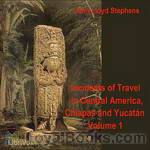 Incidents of Travel in Central America, Chiapas, and Yucatan, Vol. 1
Incidents of Travel in Central America, Chiapas, and Yucatan, Vol. 1
The year is 1838. The scene is the dense Honduran forest along the Copán River. Two men, John Lloyd Stephens and Frederick Catherwood, are about to rediscover Mayan civilization. Their guide, slashing through the rampant growth with his machete, leads them to a structure with steps up the side, shaped like a pyramid. Next they see a stone column, fourteen feet high, sculptured on the front with a portrait of a man, “solemn, stern and well fitted to excite terror,” covered on the sides with hieroglyphics, and with workmanship “equal to the finest monuments of the Egyptians... | |
 Incidents of Travel in Central America, Chiapas, and Yucatán, Vol. 2
Incidents of Travel in Central America, Chiapas, and Yucatán, Vol. 2
The year is 1838. The scene is the dense Honduran forest along the Copán River. Two men, John Lloyd Stephens and Frederick Catherwood, are about to rediscover Mayan civilization. Their guide, slashing through the rampant growth with his machete, leads them to a stone column, fourteen feet high, sculptured on the front with a portrait of a man, “solemn, stern and well fitted to excite terror,” covered on the sides with hieroglyphics, and with workmanship “equal to the finest monuments of the Egyptians... | |
By: John Lockwood (1826?-1901) | |
|---|---|
 Our campaign around Gettysburg Being a memorial of what was endured, suffered and accomplished by the Twenty-third regiment
Our campaign around Gettysburg Being a memorial of what was endured, suffered and accomplished by the Twenty-third regiment
| |
By: John Lord (1810-1894) | |
|---|---|
 Beacon Lights of History, Vol 1: The Old Pagan Civilizations
Beacon Lights of History, Vol 1: The Old Pagan Civilizations
The first of 14 volumes, this book discusses ancient civilization looking primarily at religion and philosophy. | |
 A Modern History, From the Time of Luther to the Fall of Napoleon For the Use of Schools and Colleges
A Modern History, From the Time of Luther to the Fall of Napoleon For the Use of Schools and Colleges
| |
 Ancient States and Empires
Ancient States and Empires
| |
 The Old Roman World, : the Grandeur and Failure of Its Civilization.
The Old Roman World, : the Grandeur and Failure of Its Civilization.
| |
By: John Lothrop Motley (1814-1877) | |
|---|---|
 The Rise of the Dutch Republic (1555-84)
The Rise of the Dutch Republic (1555-84)
| |
 History of the United Netherlands (1584-1609)
History of the United Netherlands (1584-1609)
| |
 Life and Death of John of Barneveld
Life and Death of John of Barneveld
| |
 Quotations from John L. Motley Works
Quotations from John L. Motley Works
| |
 Causes Of The American Civil War
Causes Of The American Civil War
John Lothrop Motley was an American author and popular diplomat, who helped to prevent European intervention on the side of the Confederates in the American Civil War. In 1861, just after the outbreak of the American Civil War, Motley wrote two letters to The Times defending the Federal position, and these letters, afterwards reprinted as [this] pamphlet entitled Causes of the Civil War in America, made a favourable impression on President Lincoln. Partly owing to this essay, Motley was appointed... | |
By: John Lubbock (1834-1913) | |
|---|---|
 The Beauties of Nature and the Wonders of the World We Live In
The Beauties of Nature and the Wonders of the World We Live In
| |
By: John Ludlum McConnel (1826-1862) | |
|---|---|
 Western Characters or Types of Border Life in the Western States
Western Characters or Types of Border Life in the Western States
| |
By: John M. (John Metcalf) Taylor (1845-1918) | |
|---|---|
 The Witchcraft Delusion in Colonial Connecticut (1647-1697)
The Witchcraft Delusion in Colonial Connecticut (1647-1697)
| |
By: John M. (John Mullin) Batten (1837-1916) | |
|---|---|
 Reminiscences of Two Years in the United States Navy
Reminiscences of Two Years in the United States Navy
| |
By: John M. Douglass | |
|---|---|
 Indians in Wisconsin's History
Indians in Wisconsin's History
Pre-European arrival history of Wisconsin's Native American tribes, with discussions of their way of life, crafts, clothing, shelter, hunting, fishing and farming. Their activity and battles during French, British and U.S. rule of the territory. Extermination and forced removal of tribes to agencies and reservations. Numbers of survivors from original tribes and plight of those remaining in the 20th century. Popular Science Handbook No. 6, published by the Milwaukee Public Museum in 1954. Summary by Verla Viera | |
By: John M. Garvan | |
|---|---|
 The Manóbos of Mindanáo Memoirs of the National Academy of Sciences, Volume XXIII, First Memoir
The Manóbos of Mindanáo Memoirs of the National Academy of Sciences, Volume XXIII, First Memoir
| |
By: John M. Synge (1871-1909) | |
|---|---|
 In Wicklow and West Kerry
In Wicklow and West Kerry
| |
By: John MacCunn (1846-1929) | |
|---|---|
 Six Radical Thinkers: Bentham, J.S. Mill, Cobden, Carlyle, Mazzini, T.H. Green
Six Radical Thinkers: Bentham, J.S. Mill, Cobden, Carlyle, Mazzini, T.H. Green
A radical is a person who holds extreme or unconventional convictions and who advocates fundamental political, economic, or social reforms. In this volume, the Scottish philosopher, John MacCunn, presents the life and thought of Jeremy Bentham, John Stuart Mill, Richard Cobden, Thomas Carlyle, Giuseppe Mazzini, and Thomas Hill Green-- six radical thinkers whose influence produced fundamental and progressive change in 19th century society. - Summary by Pamela Nagami, M.D. | |
By: John Mark | |
|---|---|
 Jesus of Nazareth, A Biography
Jesus of Nazareth, A Biography
"Jesus of Nazareth, a Biography, by John Mark," recognizes the author of the second Gospel as that "John, whose surname was Mark" (Acts 15:37), whom Barnabas chose as companion when he sailed for Cyprus on his second missionary journey. In making use of the new title, the plan of the Editor is to present "The Gospel: According to Mark" as it would be printed were it written in the twentieth rather than the first century. (Introduction from Forward, by D. Appleton & Co, Publishers, 1922) | |
By: John Marshall (1755-1835) | |
|---|---|
 The Life Of George Washington
The Life Of George Washington
| |
By: John Masefield (1878-1967) | |
|---|---|
 On the Spanish Main Or, Some English forays on the Isthmus of Darien.
On the Spanish Main Or, Some English forays on the Isthmus of Darien.
| |
 The Old Front Line
The Old Front Line
| |
By: John Mason Peck (1789-1858) | |
|---|---|
 A New Guide for Emigrants to the West
A New Guide for Emigrants to the West
| |
By: John Maynard Keynes (1883-1946) | |
|---|---|
 Economic Consequences of the Peace
Economic Consequences of the Peace
The Economic Consequences of the Peace (1919) was a best seller throughout the world, published by John Maynard Keynes. Keynes attended the Versailles Conference as a delegate of the British Treasury and argued for a much more generous peace with Germany. The book was critical in establishing a general worldwide opinion that the Versailles Treaty was a brutal and unfair peace towards Germany. It helped to consolidate American public opinion against the treaty and involvement in the League of Nations... | |
By: John McAllister Schofield (1831-1906) | |
|---|---|
 Forty-Six Years in the Army
Forty-Six Years in the Army
| |
By: John McElroy (1846-1929) | |
|---|---|
 Andersonville A Story of Rebel Military Prisons
Andersonville A Story of Rebel Military Prisons
| |
 Andersonville — Volume 1 A Story of Rebel Military Prisons
Andersonville — Volume 1 A Story of Rebel Military Prisons
| |
 The Red Acorn
The Red Acorn
| |
By: John McLean (1799-1890) | |
|---|---|
 Notes of a Twenty-Five Years' Service in the Hudson's Bay Territory Volume II.
Notes of a Twenty-Five Years' Service in the Hudson's Bay Territory Volume II.
| |
 Notes of a Twenty-Five Years' Service in the Hudson's Bay Territory Volume I.
Notes of a Twenty-Five Years' Service in the Hudson's Bay Territory Volume I.
| |
By: John Milton (1608-1674) | |
|---|---|
 History of Britain
History of Britain
A reader of this history, encountering the frequent references to “my author,” meaning the current source, will be reminded of DON QUIXOTE and of THE MORTE D'ARTHUR, for Milton employs a style that might be called dissertational rather than novelistic; he carefully identifies his sources and often quotes from them. However, much of the scholarly documentation has been omitted from the reading—all except footnotes indicating the years—to avoid cumbersome interruptions. What will be obvious to a listener, though, is that Milton uses earlier chronicles with discretion... | |
By: John Moody (1868-1958) | |
|---|---|
 The Railroad Builders; a chronicle of the welding of the states
The Railroad Builders; a chronicle of the welding of the states
| |
By: John Morley (1838-1923) | |
|---|---|
 The Life of William Ewart Gladstone, Vol. 1 (of 3) 1809-1859
The Life of William Ewart Gladstone, Vol. 1 (of 3) 1809-1859
| |
 Critical Miscellanies (Vol. 1 of 3) Essay 1: Robespierre
Critical Miscellanies (Vol. 1 of 3) Essay 1: Robespierre
| |
 Indian speeches (1907-1909)
Indian speeches (1907-1909)
| |
By: John Muir (1838-1914) | |
|---|---|
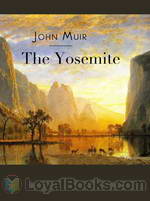 The Yosemite
The Yosemite
Anyone who's ever visited the Yosemite National Park will find this book a treasure trove of descriptions, information and evocations of the fabled beauty of this amazing piece of heaven on earth! The Yosemite by John Muir was published in 1912. Born in Scotland, England, this world-famous conservationist was a multi-talented genius. He was a geologist, naturalist, engineer, writer, botanist and a passionate and prolific writer on the preservation of the natural environment. His family migrated to America when he was just a few years old, the third of eight boisterous children... | |
 Travels in Alaska
Travels in Alaska
In 1879 John Muir went to Alaska for the first time. Its stupendous living glaciers aroused his unbounded interest, for they enabled him to verify his theories of glacial action. Again and again he returned to this continental laboratory of landscapes. The greatest of the tide-water glaciers appropriately commemorates his name. Upon this book of Alaska travels, all but finished before his unforeseen departure, John Muir expended the last months of his life. | |
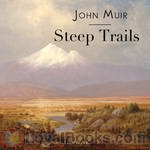 Steep Trails
Steep Trails
A collection of Muir's previously unpublished essays, released shortly after his death. "This volume will meet, in every way, the high expectations of Muir's readers. The recital of his experiences during a stormy night on the summit of Mount Shasta will take rank among the most thrilling of his records of adventure. His observations on the dead towns of Nevada, and on the Indians gathering their harvest of pine nuts, recall a phase of Western life that has left few traces in American literature... | |
By: John Munro (1849-1930) | |
|---|---|
 The Story of Electricity
The Story of Electricity
In the book's preface, the author writes: "Let anyone stop to consider how he individually would be affected if all electrical service were suddenly to cease, and he cannot fail to appreciate the claims of electricity to attentive study."In these days when we take for granted all kinds of technology - communications, entertainment, medical, military, industrial and domestic - it is interesting to learn what progress had been made in the fields of electricity and technology by the beginning of the 20th century... | |
 Heroes of the Telegraph
Heroes of the Telegraph
| |
By: John Neihardt (1881-1973) | |
|---|---|
 Splendid Wayfaring
Splendid Wayfaring
Quote: "In the following pages I have told the story of that body of adventurers who, from 1822 to 1829, opened the way for the expansion of our nation beyond the Missouri. I have made Jedediah Smith the central figure of my story, for of all explorers of the Great West he was in many ways the most remarkable, though, heretofore, our school children have not even heard his name. In order to give the student a sense of the continuity of history, I have begun my narrative with a brief account of the... | |
By: John Niles Hubbard (1815-1897) | |
|---|---|
 An Account of Sa-Go-Ye-Wat-Ha, or Red Jacket, and His People, 1750-1830
An Account of Sa-Go-Ye-Wat-Ha, or Red Jacket, and His People, 1750-1830
| |
By: John O'Mahony (1816-1877) | |
|---|---|
 The Sunny Side of Ireland How to see it by the Great Southern and Western Railway
The Sunny Side of Ireland How to see it by the Great Southern and Western Railway
| |
By: John P. Jones (1847-1916) | |
|---|---|
 India, Its Life and Thought
India, Its Life and Thought
| |
By: John Philip Newman (1826-1899) | |
|---|---|
 'America for Americans!' The Typical American, Thanksgiving Sermon
'America for Americans!' The Typical American, Thanksgiving Sermon
| |
By: John Pinkerton (1758-1826) | |
|---|---|
 Early Australian Voyages: Pelsart, Tasman, Dampier
Early Australian Voyages: Pelsart, Tasman, Dampier
| |
By: John Presland | |
|---|---|
 Lynton and Lynmouth A Pageant of Cliff & Moorland
Lynton and Lynmouth A Pageant of Cliff & Moorland
| |
By: John Quincy Adams (1767-1848) | |
|---|---|
 Orations
Orations
| |
 Letters of John Quincy Adams to His Son, on the Bible and Its Teachings
Letters of John Quincy Adams to His Son, on the Bible and Its Teachings
A collection of nine letters written by the sixth president of the United States, John Quincy Adams, to his teenage son. "Their purpose is the inculcation of love and reverence for the Holy Scriptures, and a delight in their perusal and study." - Summary by Dale Barkley | |
By: John R. (John Robert) Effinger (1869-1933) | |
|---|---|
 Women of the Romance Countries
Women of the Romance Countries
| |
 Women of the Romance Countries (Illustrated) Woman: In all ages and in all countries Vol. 6 (of 10)
Women of the Romance Countries (Illustrated) Woman: In all ages and in all countries Vol. 6 (of 10)
| |
By: John R. Hale | |
|---|---|
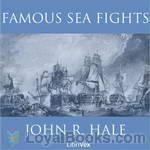 Famous Sea Fights
Famous Sea Fights
I propose to tell in non-technical and popular language the story of some of the most remarkable episodes in the history of sea power. I shall begin with the first sea-fight of which we have a detailed history—the Battle of Salamis (B.C. 480), the victory by which Themistocles the Athenian proved the soundness of his maxim that “he who commands the sea commands all.” I shall end with the last and greatest of naval engagements, the Battle of Tsu-shima, an event that reversed the long experience of victory won by West over East, which began with Salamis more than two thousand years ago... | |
By: John R. Kinnear | |
|---|---|
 History of the Eighty-sixth Regiment, Illinois Volunteer Infantry, during its term of service
History of the Eighty-sixth Regiment, Illinois Volunteer Infantry, during its term of service
| |
By: John R. Lynch (1847-1939) | |
|---|---|
 The Facts of Reconstruction
The Facts of Reconstruction
After the American Civil War, John R. Lynch, who had been a slave in Mississippi, began his political career in 1869 by first becoming Justice of the Peace, and then Mississippi State Representative. He was only 26 when he was elected to the US Congress in 1873. There, he continued to be an activist, introducing many bills and arguing on their behalf. Perhaps his greatest effort was in the long debate supporting the Civil Rights Act of 1875 to ban discrimination in public accommodations.In 1884 Lynch was the first African American nominated after a moving speech by Theodore Roosevelt to the position of Temporary Chairman of the Republican National Convention in Chicago, Illinois... | |
By: John R. Musick (1849-1901) | |
|---|---|
 The Witch of Salem
The Witch of Salem
A Historical Novel about the Salem Witch Trials. A fantastic illustrated historical novel by the prolific American author John R. Musick From the author’s preface: The "Witch of Salem" is designed to cover twenty years in the history of the United States, or from the year 1680 to 1700, including all the principal features of this period. Charles Stevens of Salem, with Cora Waters, the daughter of an indented slave, whose father was captured at the time of the overthrow of the Duke of Monmouth, are the principal characters... | |
By: John Randall (1810-1910) | |
|---|---|
 Handbook to the Severn Valley Railway Illustrative and Descriptive of Places along the Line from Worcester to Shrewsbury
Handbook to the Severn Valley Railway Illustrative and Descriptive of Places along the Line from Worcester to Shrewsbury
| |
By: John Reed (1887-1920) | |
|---|---|
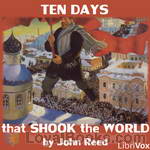 Ten Days that Shook the World
Ten Days that Shook the World
Ten Days that Shook the World (1919) is a book by American journalist and socialist John Reed about the October Revolution in Russia in 1917 which Reed experienced firsthand. Reed followed many of the prominent Bolshevik leaders, especially Grigory Zinoviev and Karl Radek, closely during his time in Russia.John Reed died in 1920, shortly after the book was finished, and he is one of the few Americans buried at the Kremlin Wall Necropolis in Moscow, a site normally reserved only for the most prominent Soviet leaders... | |
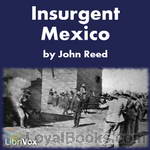 Insurgent Mexico
Insurgent Mexico
In the autumn of 1913 John Reed was sent to Mexico by the Metropolitan Magazine to report the Mexican Revolution. He shared the perils of Pancho Villa's army for four months, present with Villa's Constitutional Army when it defeated Federal forces at Torreón, opening the way for its advance on Mexico City. Reed's time with the Villistas resulted in a series of outstanding magazine articles that brought Jack a national reputation as a war correspondent. Reed deeply sympathized with the plight of the peons and vehemently opposed American intervention, which came shortly after he left... | |
By: John Reed Scott (1869-) | |
|---|---|
 Beatrix of Clare
Beatrix of Clare
| |
By: John Relly Beard (1800-1876) | |
|---|---|
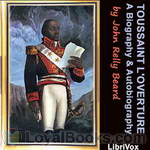 Toussaint L’Ouverture: A Biography and Autobiography
Toussaint L’Ouverture: A Biography and Autobiography
François-Dominique Toussaint L’Ouverture (1743-1803) rose to fame in 1791 during the Haitian struggle for independence. In this revolt, he led thousands of slaves on the island of Hispañola to fight against the colonial European powers of France, Spain and England. The former slaves ultimately established the independent state of Haiti and expelled the Europeans. L’Ouverture eventually became the governor and Commander-In-Chief of Haiti before recognizing and submitting to French rule in 1801... | |
 Toussaint L’Ouverture: A Biography and Autobiography
Toussaint L’Ouverture: A Biography and Autobiography
François-Dominique Toussaint L’Ouverture (1743-1803) rose to fame in 1791 during the Haitian struggle for independence. In this revolt, he led thousands of slaves on the island of Hispañola to fight against the colonial European powers of France, Spain and England. The former slaves ultimately established the independent state of Haiti and expelled the Europeans. L’Ouverture eventually became the governor and Commander-In-Chief of Haiti before recognizing and submitting to French rule in 1801... | |
By: John Richard Green (1837-1883) | |
|---|---|
 History of the English People, Volume I Early England, 449-1071; Foreign Kings, 1071-1204; The Charter, 1204-1216
History of the English People, Volume I Early England, 449-1071; Foreign Kings, 1071-1204; The Charter, 1204-1216
| |
By: John Richard Greene (1837-1883) | |
|---|---|
 Stray Studies from England and Italy
Stray Studies from England and Italy
| |
By: John Richardson (1796-1852) | |
|---|---|
 The Canadian Brothers, or the Prophecy Fulfilled a Tale of the Late American War
The Canadian Brothers, or the Prophecy Fulfilled a Tale of the Late American War
| |
By: John Ross (1777-1856) | |
|---|---|
 Memoirs and Correspondence of Admiral Lord de Saumarez, Vol. I
Memoirs and Correspondence of Admiral Lord de Saumarez, Vol. I
| |
By: John Rothwell Slater (1872-1965) | |
|---|---|
 Printing and the Renaissance A paper read before the Fortnightly Club of Rochester, New York
Printing and the Renaissance A paper read before the Fortnightly Club of Rochester, New York
| |
By: John Rushworth Jellicoe Jellicoe (1859-1935) | |
|---|---|
 The Crisis of the Naval War
The Crisis of the Naval War
| |
By: John S. C. Abbott (1805-1877) | |
|---|---|
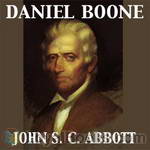 Daniel Boone
Daniel Boone
This is a detailed biography of the life and adventures of Daniel Boone. His accomplishments are brushed over in history classes these days and not given the recognition they deserve. This biography clearly paints a picture of the benevolent person of Daniel Boone as well as the achievements he made in furthering European settlement in America. | |